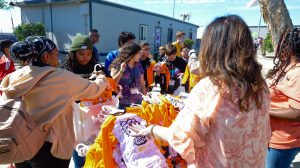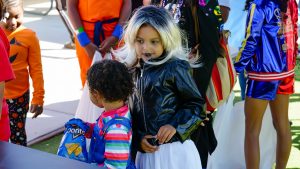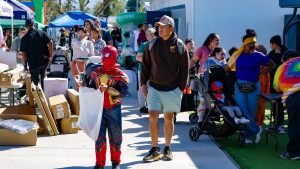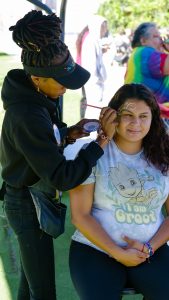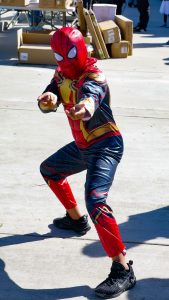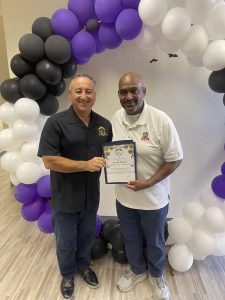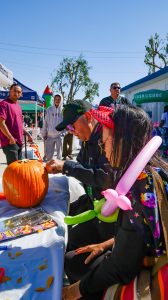By Nataki Garrett and Clyde Valentín
In this pivotal election year, as Americans face unprecedented health and social challenges, a groundbreaking new campaign is centering joy and redefining how we view the arts: not just as a form of expression or representation of culture but as a key component of community wellness. In just one day, Arts For EveryBody, a national initiative led by One Nation/One Project, showcased the power of our collective joy.
The project sought to answer one question: How can arts participation in communities influence social cohesion and well-being? On July 27th, hundreds of artists from 18 cities and towns across America worked together to find out.
Arts For Everybody brought unlikely community partners together— artists, government officials and community health leaders— to produce participatory arts projects seeking to bridge the arts with the health and well-being of our communities. The activation part of “One Nation/One Project” spanned 18 communities across the country from Hawaii to Washington state to Texas to Florida to Illinois to New York and to the nation’s capital Washington, DC and beyond to share, to create, to perform in celebration of health, community, belonging, and togetherness. Each project sought to address the unique challenges of their city, from access to clean water to access to lost customs and culture—issues that, many times, disproportionately impacted Black and brown and low-income communities. These same communities face the biggest barriers when it comes to access to the arts and health care.
At the heart of Arts for EveryBody is a commitment to addressing the deep inequities that disproportionately affect Black, brown, rural, and marginalized communities. These communities often face the greatest social challenges, from systemic health disparities to economic insecurity, yet have the least access to the healing power of the arts and quality healthcare.
At the heart of Arts for EveryBody is a commitment to addressing the deep inequities that disproportionately affect Black, brown, rural, and marginalized communities. These communities often face the greatest social challenges, from systemic health disparities to economic insecurity, yet have the least access to the healing power of the arts and quality healthcare.
Arts For EveryBody seeks to close this gap by bringing large-scale, participatory art projects directly into underserved neighborhoods, fostering not just creativity, but also mental and physical well-being. By prioritizing these communities, the project acknowledges that the arts can be a powerful tool for resilience and healing, particularly where they are needed most.
Part of the growing emphasis on participatory arts projects is research that shows a direct link to our health. In a recent paper looking at the tie between participatory art and health Dr. Jill Sonke, PhD, director of research initiatives in the Center for Arts in Medicine at the University of Florida specifically looked at “One Nation/One Project”.
“ONOP is a multifaceted initiative designed to engage the arts to strengthen the social fabric of U.S. communities on the heels of the COVID-19 pandemic. The initiative leverages collaborations between the arts, public health, and municipal sectors to build health, health equity, and well-being.”
Looking further at the reach and the impact of hundreds of artists coming together in communities all across the country shows the potential and the possibilities of arts and expression to center health and wellness for diverse groups in diverse communities. In Chicago Healing Arts Chicago hosted a citywide creative summit focused on creating, doing, and performing to highlight how artists could be trained as community health workers. In Edinburg, Texas, the community premiered an original musical, Despierta, which featured 75 community members.
Also, it explored the legacy of the Mexican painter Frida Kahlo as a way of looking at important things such as healing and belonging. In Kansas City, Missouri, the community hosted Celebrate AMERI’KANA a music and arts festival bringing together locals of all ages to celebrate the diverse history of American music. In Rhinelander, Wisconsin community members came together for a Walk Against Social Isolation, hosted a community meal, and unveiled a public art installation as their way of looking at well-being and belonging and togetherness. In each example breaking down barriers and silos and exploring inclusivity were seen as key to making sure that health equity, fair and just access to healthcare and resources, was an overarching theme.
At the center of this work is a desire to make participatory arts something that communities commit to on an ongoing basis and to bridge that work directly to the local health sector and/or the local municipality. We have a deep commitment to community engagement and accessibility, and we hope to inspire a movement where on an ongoing basis communities explore art as a way to make communities healthier, stronger, safer, and more united, thus improving the lives of everybody.
During a consequential election year, art is more important because of its ability to spur conversation about the state of the union and remind us that our commonalities should be a powerful enough force to combat ignorance and intolerance. And for the messages of the art being created and shared across the country to help us better truly, we also cannot give in to indifference.
The day’s actions demonstrated the strength of American plurality, diversity, and expression in the most hyperlocal and culturally nuanced ways. The inclusion of $210.1 million for the National Endowment for the Arts (NEA) in President Biden’s Fiscal Year 2025 Budget underscores the government’s recognition of the arts as a vital component of community well-being and equity.
This funding aligns with initiatives like “Arts For EveryBody,” which emphasize the role of arts in addressing systemic health disparities and social cohesion. The budget further promotes the transformative power of participatory arts in underserved communities by ensuring greater access to arts and health resources.
At a time in America where communities are sometimes divided, uncertain, and disjointed, here is an opportunity to unite people and communities. This is a chance to improve people’s everyday lives, whether you’re an artist or creator, a healthcare worker, a government official, or a philanthropist seeking to make positive change.
Together with a common focus, there are ways not just to have participatory arts be part of a moment, but to make participatory arts a movement, where the message is clear arts is for everybody and it really does have the power to transform lives and communities and bring us together.
What July 27 proved is that local leadership has the power to bring together factions of communities that would not ordinarily do so—from health care providers to artists and arts organizations to local elected officials. From these unlikely alliances have sprung powerful partnerships and possibilities to identify critical and unique needs in communities across America.
Arts for EveryBody is led by some of our country’s most creative thinkers. Together, they’re working to coordinate a movement guided by healing, equity, and community. https://www.artsforeverybody.org/joinus
 Westside Story Newspaper – Online The News of The Empire – Sharing the Quest for Excellence
Westside Story Newspaper – Online The News of The Empire – Sharing the Quest for Excellence


